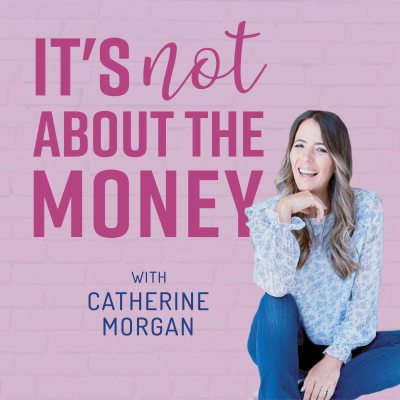
It's Not About The Money
Podcast af Catherine Morgan
It’s not about the money is for women in business who know they want to make more money whilst holding onto more money and growing an abundance of wealth. You're tired of overgiving, undercharging and being stuck in a scarcity money mindset. You know you have it in you, you just need financial confidence and an abundant mindset. You're excited and ready to learn what it takes to make more money, invest and step into wealth. Hosted by Catherine Morgan, Author, Award-winning Financial Wellbeing Speaker, Financial Coach and Trauma-informed coach. You'll learn the steps to create more wealth, grow your business, and have a better relationship with money. This is the show for you to feel good with money and to explore the meaning beyond wealth. This podcast is the one to listen to if you're a female entrepreneur. ‘Formerly the In Her Financial Shoes Podcast.’
Begrænset tilbud
3 måneder kun 9,00 kr.
Derefter 99,00 kr. / månedIngen binding.
Alle episoder
341 episoderIn this episode, I explore why we get stuck repeating the same frustrating money patterns despite reading books, listening to podcasts, and working on our mindset. Rather than blaming ourselves for being broken or lazy, I reveal the hidden psychology behind these behaviours - the secondary gains that keep us "stuck" because they're actually protecting us in some way. Episode Highlights: Understanding Secondary Gains - The Hidden Benefits * How every financial behaviour, even destructive ones, serves a positive purpose * Why our unconscious mind creates patterns to keep us safe based on old information * The concept of secondary gains as "wrapping" around our biggest fears about money * How protection mechanisms that once served us may no longer be appropriate at 43 * The difference between conscious desires and unconscious protective patterns My Personal Examples: Undercharging and Protection * How I stayed in undercharging patterns to avoid rejection and confrontation * The realisation that "you're too expensive" is about the other person's values, not my worth * My Thermomix story - how I value different things differently (£800 kitchen gadget vs. high-ticket mentoring) * The first-class flight dilemma and the guilt around spending £1,500 on comfort The Four Most Common Secondary Gains Around Money 1. Undercharging Pattern: * Primary fear: rejection, confrontation, and loss of "nice person" identity * Benefits: more people say yes, avoiding uncomfortable negotiations, staying accessible * How it prevents claiming full power and owning your brilliance * Applies to both business owners and employees negotiating pay rises 2. Chronic Saving Pattern: * Primary fear: uncertainty and lack of control * Benefits: feeling protected, being the "responsible one," avoiding buyer's remorse * How it maintains identity as the sensible person while others are "frivolous" * The trap of "never enough" despite growing bank balances 3. Money Avoidance Pattern: * Primary fear: adult responsibility and making wrong decisions * Benefits: maintaining childlike innocence, having others take responsibility * How chaos becomes an excuse to avoid goal-setting and risk-taking * Case study from my recent live coaching demonstration about staying in childlike patterns 4. Overspending/Impulse Pattern: * Primary fear: making big decisions and planning ahead * Benefits: instant emotional regulation, dopamine hits, maintaining victim identity * How it helps avoid future planning (especially challenging for neurodivergent brains) * My personal pattern of spending everything to avoid making financial decisions The Identity and Relationship Dynamics * How money patterns serve our relationships and keep peace * Client examples: fear of out-earning mentors, maintaining marriage dynamics * The "struggling artist" or "survivor" story identity * How staying financially small can protect us from jealousy and judgment * The secondary gain of maintaining harmony by not threatening others' positions Spotting Your Own Secondary Gains - Key Questions * What do you get to avoid when you stay stuck? * What identity does this pattern allow you to maintain? * How do your money patterns serve your relationships? * What would you have to face if this pattern disappeared tomorrow? * Does the possibility of change feel scary, and why? Working With Secondary Gains, Not Against Them * The importance of curiosity over judgment * How these patterns developed for good reasons and have been trying to protect us * My approach using Emotional Freedom Technique (EFT) and Matrix Re-imprinting * Combining somatic work with inherited family trauma modalities * The goal: making your financial future more exciting than the secondary gain Practical Steps for Change * Honouring what the pattern has done for you with gratitude * Speaking directly to the protective parts: "Thank you for keeping me safe" * Working with the nervous system through gradual, sustainable changes * Finding healthy ways to meet the same emotional needs differently * Why incremental price increases work better than dramatic jumps The Neurodivergent Perspective * How ADHD and autism traits can make planning ahead feel unsafe * Why spending everything now avoids future decision-making pressure * Reference to previous episodes on managing money with ADHD * protective mechanisms Chapters 00:00 Understanding Money Patterns and Secondary Gains 09:52 The Impact of Undercharging and Self-Worth 18:33 Exploring Chronic Saving and Money Avoidance 26:03 Transforming Patterns and Embracing Change Resources: Get my FREE book [https://www.itsnotaboutthemoney.co.uk/free-book] 'It's Not About The Money' Take the Money StoryTypes® Quiz [https://www.catherinemorgan.com/money] Sign up to my FREE Newsletter [https://themoneypanel.co.uk/newsletter/] Become a Certified Financial Coach [https://themoneypanel.co.uk/financial-coach-certification/] Get Investing [https://catherinemorgan.com/get-investing-course/] with my course - Use code INVEST50OFF2024 for 50% off as a podcast listener. Discover how to manage money when you have ADHD - watch a Live Money Clearing Financial Coaching demo video [https://youtu.be/40328sJWRfU?si=61Rq6AQNH8e3CuE7]
My Personal Financial Adviser Paradox * How I spent years giving brilliant financial advice whilst being unable to follow it myself * Why excess money never felt safe to hold - everything above day-to-day needs felt dangerous * The realisation that it wasn't about willpower, knowledge, or self-control * How inherited beliefs about money scarcity and "dirty money" from family arguments shaped my nervous system responses Understanding Borrowed Beliefs - The Father Christmas Analogy * Borrowed beliefs as gifts in Father Christmas's sack - given with love but not all serving us today * How these beliefs often hold secondary gains and serve us in some way (usually safety) * The importance of returning unused "gifts" with love and gratitude to break generational patterns * Why changing our money relationship impacts every future generation Where Inherited Money Scripts Come From * Family dynamics and early childhood experiences (my Warwick Castle story about my brother losing £20) * Religious and cultural influences on money beliefs * Specific historical events our families lived through * Personal money experiences that create lasting impressions * The crucial question: "In my family, money was..." The Three Predictable Patterns of Borrowed Beliefs Low Receiving Pattern: * Difficulty allowing money, opportunities, or compliments to come in * Common beliefs: "Rich people are greedy," "Money corrupts people," "I don't deserve money" * Shows up as: undercharging, deflecting compliments, turning down opportunities, feeling guilty about success * My personal example of struggling with praise and awards Low Holding Pattern: * Brilliant at making money but terrible at keeping it * Common beliefs: "Money disappears anyway," "Something bad happens when I have too much" * Shows up as: impulsive spending after earning well, self-sabotage when successful, anxiety about bank balances * Case study of my student hitting six-figure months then immediately booking lavish holidays Low Giving Pattern: * Fear-based hoarding rather than conscious saving * Common beliefs: "I can't afford to be generous," "If I give, there won't be enough for me" * Shows up as: difficulty investing in yourself, anxiety about spending on others, perpetual "rainy day" saving The Family Money Tree Exercise * How to map out your family's money patterns across generations * Questions to explore: Was money talked about openly? Was it a source of arguments? Who controlled money? * Common inherited phrases and their impacts: * "Money doesn't grow on trees" = scarcity programming * "Money's the root of all evil" = spiritual guilt around wealth * "We can't afford it" = limitation mindset * "Money doesn't buy happiness" = pacifist money story The Generational and Cultural Context * How survival strategies from the Great Depression or wartime still influence us today * Different cultural approaches to wealth - celebration vs. modesty * Gender dynamics between maternal and paternal money influences * The historical context that made these beliefs necessary for survival Conscious Choice and Legacy Work * Recognising which beliefs served our families but no longer serve us * The power shift from unconscious inheritance to conscious choice * How this work creates transformation for coaches, therapists, and financial professionals * The ripple effect of changing generational money patterns Final Thought This episode emphasises that changing our relationship with money isn't just personal work - it's legacy work that impacts every future generation. When we consciously choose which inherited beliefs to keep and which to lovingly release, we're not just transforming our own financial reality, we're changing the money story for generations to come. Chapters 00:00 Introduction to Money Beliefs 02:10 The Impact of Family Money Stories 05:25 Understanding Borrowed Beliefs 08:32 Identifying Personal Money Experiences 11:57 The Blueprint of Money in Families 17:00 Patterns of Money Behavior 22:24 Mapping Your Money Tree 29:44 Choosing New Money Beliefs Resources: Get my FREE book [https://www.itsnotaboutthemoney.co.uk/free-book] 'It's Not About The Money' Take the Money StoryTypes® Quiz [https://www.catherinemorgan.com/money] Sign up to my FREE Newsletter [https://themoneypanel.co.uk/newsletter/] Become a Certified Financial Coach [https://themoneypanel.co.uk/financial-coach-certification/] Get Investing [https://catherinemorgan.com/get-investing-course/] with my course - Use code INVEST50OFF2024 for 50% off as a podcast listener. Listen to the previous podcast episode - The Future Of Money and AI With Natalie MacNeil [https://catherinemorgan.com/podcastarchive/the-future-of-money-and-ai-with-natalie-macneil/] Listen to the previous podcast episode - How Digital Currency Is Rewiring Our Money Mindset [https://catherinemorgan.com/podcastarchive/how-digital-currency-is-rewiring-our-money-mindset/]
In this episode, I share insights from my recent interview with UK-based global company Agon about the crucial link between mental health and money. Rather than offering quick fixes, I explore the deeper emotional landscape beneath financial anxiety and provide six key questions to help you understand what's really driving your money worries Episode Highlights: Understanding the Root of Money Worries * Money itself isn't usually what we're worried about - it's what money represents * Common underlying fears: relationship security, business stability, lifestyle changes, and team obligations * How financial anxiety often stems from deeper meanings we attach to money * The difference between surface-level money concerns and their emotional foundations The Emotional Spectrum of Money * My ladder metaphor: low-vibrational emotions at the bottom (shame, guilt, stress, anger) vs high-vibrational emotions at the top (gratitude, joy, happiness) * Why jumping straight to gratitude practices doesn't work when you're experiencing financial shame * The crucial middle step: acceptance of past decisions, inherited beliefs, and trauma patterns * How the nervous system creates fight-or-flight responses to protect us from perceived financial threats The Complexity of Money Shame * Why shame is the hardest emotion on the spectrum to shift * How shame creates a freeze response in the nervous system, leading to financial avoidance * Recognising shame through language: the "shoulds" we place on ourselves ("I should be good with money," "I should be further ahead") * The importance of compassionate acknowledgement without judgement Money and Neurodiversity * How traditional financial advice assumes neurotypical learning styles * Specific challenges for neurodivergent individuals: impulse control, budgeting, long-term planning * My personal ADHD experience: visual presentations, movement during money conversations, shorter but more frequent meetings * The correlation between depression, anxiety, and financial avoidance Beyond Traditional Financial Solutions * Why practical solutions (budgets, investment plans) don't work without addressing underlying emotions * The problem with control-based planning when control doesn't feel safe * How impulsive spending patterns can sabotage investment strategies if safety concerns aren't addressed * The importance of understanding emotional patterns before implementing financial tools Professional Development for Coaches * How coaches can support clients with money conversations without being qualified financial advisers * The power of holding space for psychological exploration around money decisions * Tools and frameworks for understanding the patterns behind financial behaviours * My financial coach certification programme and free 40-minute training Final Thought This episode emphasises that healing our relationship with money requires understanding the emotional spectrum beneath our financial behaviours. Rather than bypassing difficult emotions to reach gratitude and joy, lasting change comes through accepting where we are, understanding our protective patterns, and working with our individual psychological makeup. Chapters 00:00 Understanding Money Worries and Emotions 06:11 The Emotional Spectrum of Money 12:43 Navigating Mental Health and Money Conversations Resources: Get my FREE book [https://www.itsnotaboutthemoney.co.uk/free-book] 'It's Not About The Money' Take the Money StoryTypes® Quiz [https://www.catherinemorgan.com/money] Sign up to my FREE Newsletter [https://themoneypanel.co.uk/newsletter/] Come to our Wealth Awakening Retreat [https://catherinemorgan.com/wealth-awakening-retreat/] Become a Certified Financial Coach [https://themoneypanel.co.uk/financial-coach-certification/] Get Investing [https://catherinemorgan.com/get-investing-course/] with my course - Use code INVEST50OFF2024 for 50% off as a podcast listener. Watch the FREE masterclass here [https://themoneypanel.co.uk/3-hidden-money-narratives-masterclass/#training-form] Listen to The best way to plan your finances if you have adult ADHD [https://catherinemorgan.com/podcastarchive/the-best-way-to-plan-your-finances-if-you-have-adult-adhd/] Listen to How to Manage Money in Business When You Have ADHD [https://catherinemorgan.com/podcastarchive/how-to-manage-money-in-business-when-you-have-adhd/] Listen to (Money StoryTypes®) Money Shame & Emotional Spending [https://catherinemorgan.com/podcastarchive/money-storytypes-money-shame-emotional-spending/] listen to my 1 Way To Overcome Money Shame [https://catherinemorgan.com/podcastarchive/1-way-to-overcome-money-shame/]
Episode Overview In this follow-up episode to last week's conversation with Natalie MacNeil, I explore the psychological and emotional shifts required as we move into the digital currency era. Rather than focusing on technical aspects, this episode addresses the deeper questions about trust, safety, and completely rewiring how our brains think about money. Episode Highlights: The Physical vs Digital Money Mindset * Our brains are hardwired to equate real money with tangible things we can hold and count * Why Brits love property investing: it's "bricks and mortar" compared to US generations who prefer renting * Digital currencies ask us to place value in mathematics and community consensus rather than government * The challenge of trusting numbers on a screen that exist in cloud-based systems * How our nervous system was designed to equate safety with things we can physically control Understanding Digital Currencies Simply * Digital currencies as numbers stored on a huge shared computer network * Unlike bank account numbers controlled by one institution, these are verified by thousands of computers worldwide * Bitcoin as "digital gold" - limited in supply and designed to hold value * Ethereum as a digital platform for building applications and communities * The key difference: controlled by mathematics and community, not governments or banks The Generational Divide * Personal story of 11-year-old son naturally gravitating toward digital wallets * How younger generations view money as naturally existing "on a phone" * Older clients who still prefer printed bank statements * The comfort level with digital currencies often depends on how one grew up with technology The Great Trust Transfer * Examining where we've been placing our trust: banks as the "safe option" * The 2008 financial crisis and recent bank failures like Silicon Valley Bank * COVID money printing diluting the value of every pound in bank accounts * The psychological shift from "the bank will look after my money" to "I am my own bank" * Why trusting ourselves feels riskier than trusting institutions that have failed us The Pearl Analogy from Gene Keys * Richard Rudd's symbolism of the pearl as feminine metaphor for prosperity * How pearls form from pressure and irritation, not perfection * Wealth coming from responding with grace to challenges rather than ease * Digital currencies as the "pearl" - transforming financial friction into something beautiful * Moving from hoarding for ourselves to community and shared values Practical Steps for Building Confidence * Using AI to create personalised learning courses about digital currencies * Starting with 2-3% portfolio allocation to learn gradually * The challenge of getting advice from traditional financial advisors due to regulatory constraints * Beginning with small enough amounts to sleep at night but large enough to genuinely learn * Treating it like learning any new skill - expecting a gradual comfort-building process Educational Resources * Creating AI prompts to build beginner's guides tailored to individual situations * Recommendation for Natalie McNeil's AI Dream Team course for entrepreneurs * Catherine's book "It's Not About the Money" as foundational mindset work * The Get Investing Course for beginner investors with 50% discount code INVEST50OFF2024 Final Thought This transformation is about trust, not technology. We're living through one of the biggest shifts in how humans relate to money since moving away from the gold standard. The key is giving yourself permission to start learning gradually and allowing your nervous system time to adjust, just as it did with online banking. Chapters 00:00 Rewiring Our Money Mindset 04:21 Understanding Digital Currencies 10:03 Generational Perspectives on Money 11:59 Trust and Financial Institutions 15:19 The Pearl Analogy: Transformation in Wealth 21:30 Practical Steps for Building Confidence 28:19 Trust Over Technology: A New Approach Resources: Get my FREE book [https://www.itsnotaboutthemoney.co.uk/free-book] 'It's Not About The Money' Take the Money StoryTypes® Quiz [https://www.catherinemorgan.com/money] Sign up to my FREE Newsletter [https://themoneypanel.co.uk/newsletter/] Come to our Wealth Awakening Retreat [https://catherinemorgan.com/wealth-awakening-retreat/] Become a Certified Financial Coach [https://themoneypanel.co.uk/financial-coach-certification/] Discover how to screen your investment portfolio with an ethical lens [https://www.ethicalscreening.co.uk/] Explore the AI Dream Team Course [https://millscatherine--coachingevolved.thrivecart.com/ai-dream-team-accelerator/] (Please note we are an affiliate for this course which means we may earn an affiliate commission for any purchases) I have personally invested and completed this course to help me save hours of time in my business. Download your AI Prompt Playbook [https://millscatherine--coachingevolved.thrivecart.com/ai-dream-team/67acdc27756d0/] Sign up to Natalie’s Weekly Newsletter [https://millscatherine--coachingevolved.thrivecart.com/ai-dream-team/67acdc42756d1/] Listen to podcast episode: Understanding your deep resistance to success through the lens of Gene Keys [https://catherinemorgan.com/podcastarchive/fear-of-success-understanding-your-deep-resistance-to-success/] Get Investing [https://catherinemorgan.com/get-investing-course/] with my course - Use code INVEST50OFF2024 for 50% off as a podcast listener.
In this forward-thinking episode, I'm joined by Emmy award-winning media entrepreneur and futurist Natalie MacNeil to explore the radical transformation of money happening before our eyes. From decentralised finance to community wealth-building, we dive deep into what the future holds for how we earn, save, and invest. The Dragonfly Metaphor * Richard Rudd's story of the dragonfly as a metaphor for our current financial transformation * Water nymphs living underwater with no concept of flying - representing our current understanding of money * The biological impulse to climb up and transform into something completely different * How we're about to experience a shift as dramatic as moving from water to flying through air From Individual to Collective Wealth * The shift from individual wealth-building to community-focused financial systems * How AI, robotics, automation, and blockchain will converge to change everything * The "zero cost margin scenario" - when robots can produce almost everything for nearly free * Why community and focusing on "being human" becomes crucial as machines replace human labour Decentralised Finance Revolution * How fiat currency is backed by trust, not gold, creating vulnerability to government money printing * The concept of being "your own bank" through decentralised finance * Smart contracts replacing traditional intermediaries like bankers and lawyers * Decentralised Autonomous Organisations (DAOs) returning power to communities * Real examples already happening: Tesla robo-taxis that can work and earn money autonomously New Forms of Wealth Creation * Why future wealth won't come from jobs but from owning the machines and AI doing the work * Capital ownership becoming more crucial than ever * Examples of productive digital assets and cryptocurrency staking * The importance of creating a "low burn digital life" with location independence Portfolio Allocation and Risk Management * Natalie's 15% crypto allocation vs traditional financial advice of 2-3% * The importance of age and risk tolerance in allocation decisions * Warning against valueless meme coins and alt coins without real utility * Focus on coins with genuine technology and long-term value propositions Values-Based Investing in Digital Assets * Screening investments for environmental impact and sustainability * Using AI tools to analyse portfolio alignment with personal values * The concept of money as "a prayer" - investing with sacred intention * Gradual transition rather than wholesale portfolio changes Practical Implementation Strategies * Using AI to create personalised financial education courses * Building custom GPTs as investment advisors with daily market updates * Incorporating emotional forecasting and fear/greed index monitoring * The tokenisation of real-world assets like property for easier transactions Preparing the Next Generation * How financial education will be radically different in five years * Teaching children about digital assets and decentralised systems * The importance of understanding both traditional and future financial systems Final Thought This transformation requires both practical preparation and spiritual growth. As robots free up human time, we must explore deeper questions about purpose, abundance, and what it means to be human. The future is moving from scarcity to abundance - but only for those who prepare and adapt. Chapters 00:00 Introduction to the Future of Money 02:52 The Dragonfly Metaphor: Transitioning to New Realities 05:48 From Individual Wealth to Collective Wealth 09:07 The Role of Community in the Future Economy 12:01 Decentralized Finance: A New Financial Paradigm 15:02 Opportunities and Risks in the New Financial Landscape 18:02 Capital Ownership and the Rise of AI 20:46 Investing in the Future: Strategies for Success 23:59 Navigating Risks in the Digital Age 27:14 Understanding Cryptocurrencies: A Beginner's Guide 35:35 The Concept of VisionCoin 38:04 Investing in Decentralized Finance 40:50 Ethical and Values-Based Investing 42:40 Tokenization of Assets 44:52 Practical Steps for Ethical Investing 50:02 Leveraging AI for Financial Education 56:27 The Emotional Aspect of Investing 01:00:29 Preparing for a New Financial Paradigm Resources: Get my FREE book [https://www.itsnotaboutthemoney.co.uk/free-book] 'It's Not About The Money' Take the Money StoryTypes® Quiz [https://www.catherinemorgan.com/money] Sign up to my FREE Newsletter [https://themoneypanel.co.uk/newsletter/] Come to our Wealth Awakening Retreat [https://catherinemorgan.com/wealth-awakening-retreat/] Become a Certified Financial Coach [https://themoneypanel.co.uk/financial-coach-certification/] Discover how to screen your investment portfolio with an ethical lens [https://www.ethicalscreening.co.uk/] Explore the AI Dream Team Course [https://millscatherine--coachingevolved.thrivecart.com/ai-dream-team-accelerator/] (Please note we are an affiliate for this course which means we may earn an affiliate commission for any purchases) I have personally invested and completed this course to help me save hours of time in my business. Download your AI Prompt Playbook [https://millscatherine--coachingevolved.thrivecart.com/ai-dream-team/67acdc27756d0/] Sign up to Natalie’s Weekly Newsletter [https://millscatherine--coachingevolved.thrivecart.com/ai-dream-team/67acdc42756d1/] Listen to podcast episode: Understanding your deep resistance to success through the lens of Gene Keys [https://catherinemorgan.com/podcastarchive/fear-of-success-understanding-your-deep-resistance-to-success/]
Begrænset tilbud
3 måneder kun 9,00 kr.
Derefter 99,00 kr. / månedIngen binding.
Eksklusive podcasts
Uden reklamer
Gratis podcasts
Lydbøger
20 timer / måned

































